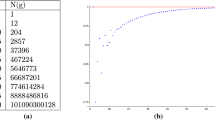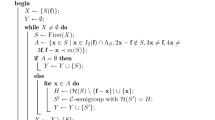Abstract
We examine two natural operations to create numerical semigroups. We say that a numerical semigroup \({\mathcal {S}}\) is k-normalescent if it is the projection of the set of integer points in a k-dimensional polyhedral cone, and we say that \({\mathcal {S}}\) is a k-quotient if it is the quotient of a numerical semigroup with k generators. We prove that all k-quotients are k-normalescent, and although the converse is false in general, we prove that the projection of the set of integer points in a cone with k extreme rays (possibly lying in a dimension smaller than k) is a k-quotient. The discrete geometric perspective of studying cones is useful for studying k-quotients: in particular, we use it to prove that the sum of a \(k_1\)-quotient and a \(k_2\)-quotient is a \((k_1+k_2)\)-quotient. In addition, we prove several results about when a numerical semigroup is not k-normalescent.
Similar content being viewed by others
Notes
The word normalescent is meant to evoke that it is obtained from a normal semigroup via the process of projection; similar variants on the word “normal” tend to have some established meaning.
References
Adeniran, A., Butler, S., Defant, C., Gao, Y., Harris, P., Hettle, C., Liang, Q., Nam, H., Volk, A.: On the genus of a quotient of a numerical semigroup. Semigroup Forum 98(3), 690–700 (2019)
Bogart, T., O’Neill, C., Woods, K.: When is a numerical semigroup a quotient?, Bull. Aust. Math. Soc., to appear (2023)
Cox, D., Little, J., Schenck, H.: Toric Varieties, Graduate Texts in Mathematics, vol. 124. Springer, New York (2011)
Danzer, L., Grünbaum, B., Klee, V.: Helly’s theorem and its relatives. Monatsh. Math. 31, 60–97 (1921)
Elizalde, S., Woods, K.: The probability of choosing primitive sets. J. Number Theory 125, 39–49 (2007)
Lekkerkerker, C.A.: Geometry of Numbers, Series Biblioteca, Vol. 8, Elsevier (2014)
Moscariello, A.: Generators of a fraction of a numerical semigroup. J. Commut. Algebra 11(3), 389–400 (2019)
Newman, M.: The Smith normal form. Linear Algebra Appl. 254, 367–381 (1997)
Rosales, J.C.: Numerical semigroups that differ from a symmetric numerical semigroup in one element. Algebra Colloq. 15(1), 23–32 (2008)
Rosales, J., García-Sánchez, P.: Pseudo-symmetric numerical semigroups with three generators. J. Algebra 291(1), 46–54 (2005)
Rosales, J., García-Sánchez, P.: Numerical Semigroups, Developments in Mathematics, vol. 20. Springer, New York (2009)
Rosales, J., García-Sánchez, P., García-García, J., Jiménez Madrid, J.: Fundamental gaps in numerical semigroups. J. Pure Appl. Algebra 189(1–3), 301–313 (2004)
Rosales, J., García-Sánchez, P., García-García, J., Urbano-Blanco, J.: Proportionally modular Diophantine inequalities. J. Number Theory 103(2), 281–294 (2003)
Rosales, J., García-Sánchez, P., Urbano-Blanco, J.: The set of solutions of a proportionally modular Diophantine inequality. J. Number Theory 128(3), 453–467 (2008)
Rosales, J.C., Urbano-Blanco, J.M.: Proportionally modular Diophantine inequalities and full semigroups. Semigroup Forum 72, no. 3, 362–374 (2006)
Schrijver, A.: Theory of Linear and Integer Programming. Wiley, New York (1998)
Smith, H.J.S.: On systems of linear indeterminate equations and congruences. Philos. Trans. R. Soc. Lond. 151, 293–326 (1861)
Stanley, R.: Smith normal form in combinatorics. J. Comb. Theory A 144, 476–495 (2016)
Wang, Y., Stanley, R.: The Smith normal form distribution of a random integer matrix. SIAM J. Discrete Math. 31, 2247–2268 (2017)
Wolfram, S.: The MATHEMATICA® book, version 4. Cambridge University Press, Cambridge (1999)
Woods, K.: GitHub repository (2023). github.com/kevwoods/Normalescense
Acknowledgements
Tristram Bogart was supported by internal research grant INV-2020-105-2076 from the Faculty of Sciences of the Universidad de los Andes.
Author information
Authors and Affiliations
Corresponding author
Additional information
Editor in Charge: Kenneth Clarkson
Publisher's Note
Springer Nature remains neutral with regard to jurisdictional claims in published maps and institutional affiliations.
Rights and permissions
Springer Nature or its licensor (e.g. a society or other partner) holds exclusive rights to this article under a publishing agreement with the author(s) or other rightsholder(s); author self-archiving of the accepted manuscript version of this article is solely governed by the terms of such publishing agreement and applicable law.
About this article
Cite this article
Bogart, T., O’Neill, C. & Woods, K. Numerical Semigroups via Projections and via Quotients. Discrete Comput Geom (2024). https://doi.org/10.1007/s00454-024-00643-z
Received:
Revised:
Accepted:
Published:
DOI: https://doi.org/10.1007/s00454-024-00643-z




